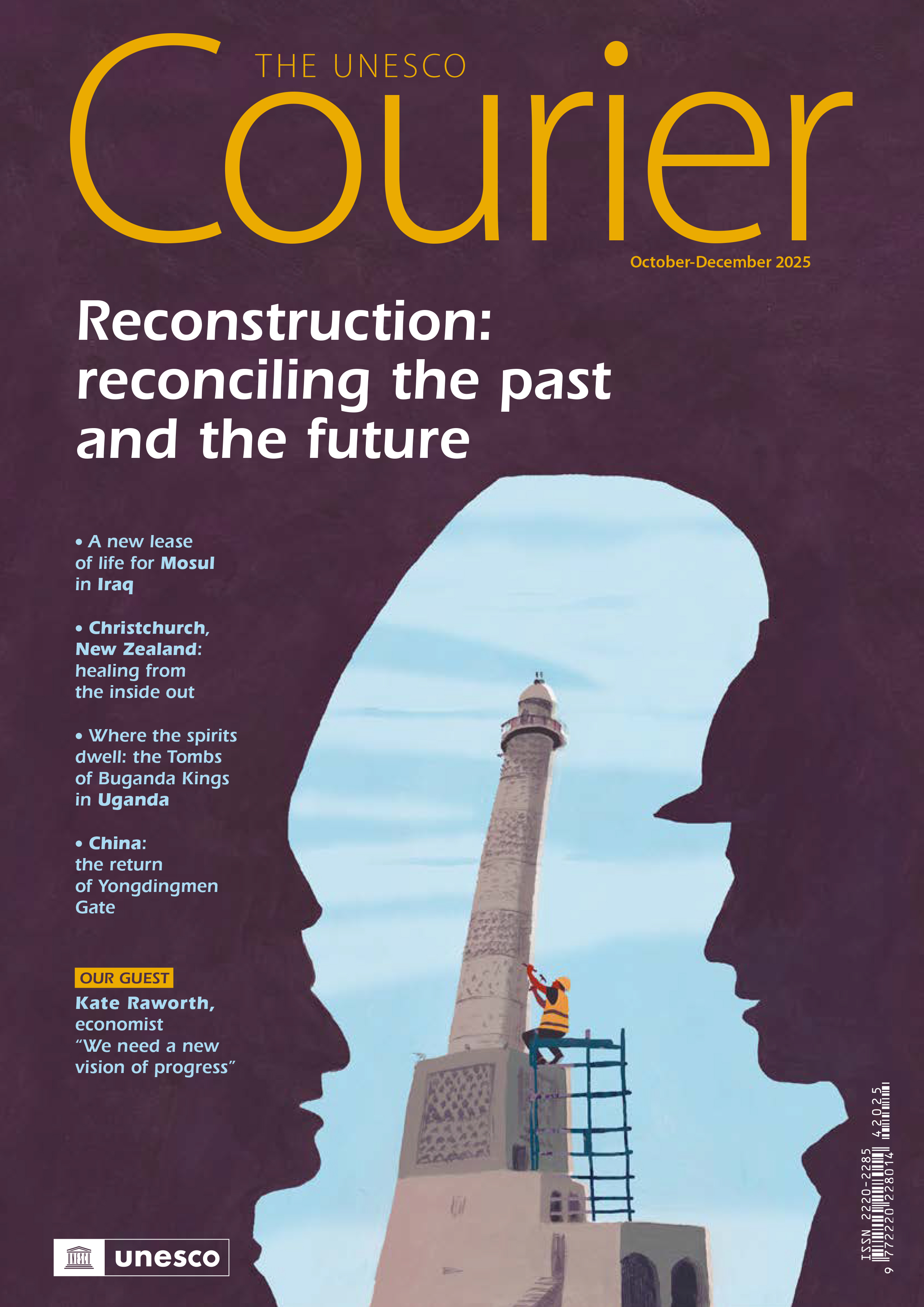The UNESCO Courier - Current Issue
Volume 2025, Issue 4, 2025
-
-
Why rebuild?
More LessReconstruction is, literally, the act of building again something that has been damaged or demolished. But the term covers very different situations depending on the context, extent and origin of the destruction. Above all, it says nothing about what motivates societies to restore or reconstruct certain elements of their built heritage.
-
-
-
A new lease of life for Mosul
More LessAs a model for urban renewal, UNESCO’s “Revive the Spirit of Mosul” initiative went well beyond simply reconstructing the built environment. It also strove to revitalize the cultural life of the Iraqi city, devastated after three years of occupation by Daesh.
-
-
-
Christchurch: healing from the inside out
More LessFollowing a devastating earthquake in 2011, new constructions in New Zealand’s second-largest city have been built to resist tremors. Innovative construction techniques have since become a hallmark of the post-earthquake era. A burst of creativity, driven by local residents, has also emerged from the collective trauma.
-
-
-
Where the spirits dwell: the Tombs of Buganda Kings in Uganda
More LessUgandan architect Jonathan Nsubuga participated in the reconstruction of the Tombs of Buganda Kings after a devastating fire in 2010. The sacred site in central Uganda is built entirely from traditional materials. In addition to the architectural and technological challenges, the immaterial dimension of this site devoted to communication with spirits was a key consideration.
-
-
-
The revival of AlUla’s Old Town
More LessAbandoned by its inhabitants in the 1980s, the mud brick houses of Al-Deira, the Old Town of AlUla in northwestern Saudi Arabia, began to succumb to environmental damage. A massive restoration effort, guided by ancient practices and using traditional materials, has breathed new life into this historic neighbourhood.
-
-
-
Warsaw: a twofold approach
More LessLargely destroyed during the Second World War, the Polish capital underwent a unique reconstruction process, combining conservation and modernization. An architectural feat, its success and speed were due to the political situation but also the participation of its inhabitants.
-
-
-
A Mayan city in Guatemala, rescued from oblivion
More LessLong buried beneath the tropical forest, the Mayan site of La Blanca, in the north of the country, has been the focus of a significant conservation effort that has helped raise the inhabitants’ awareness of the value of this historic heritage.
-
-
-
China: the return of the Yongdingmen Gate
More LessDemolished in 1957 to meet the new needs of Beijing’s urban development, the Yongdingmen Gate Tower was rebuilt in 2004. Twenty years later, this iconic building was inscribed on the World Heritage List as a component of the Beijing Central Axis.
-
-
-
Zoom: The rediscovered memory of Gerrit
More Lessor those who are familiar with the building, the F UNESCO Press Room has the aura of legend, one that is in the process of being revived after decades of obscurity. Designed by Gerrit Rietveld as a commission donated by the Dutch Government for UNESCO’s headquarters in 1958, the Press Room was a functional workspace for journalists and also a living work of art.
-
-
-
Ideas: Artificial intelligence and art: a decisive moment?
More LessNow that generative AI can create everything from photorealistic portraits to imaginative landscapes, is the role of the artist — especially the photographer — about to become obsolete? Not necessarily. As professor Ahmed Elgammal points out, the advent of photography was similarly perceived as a threat to artistic expression in the 19th century. Yet it spurred new movements and gained recognition as an art form itself. In a similar fashion, AI could usher in a new creative era.
-
-
-
Our guest: Kate Raworth: “We need a new vision of the shape of progress”
More LessWhat has a doughnut to do with the planet? At first glance, nothing. But British economist Kate Raworth uses this powerful image to lay out the conditions for a sustainable economy. In her 2017 bestseller, Doughnut Economics: Seven ways to think like a 21st-century economist, she presents a model that meets the needs of all people, while respecting the planet’s limited resources.
-
-
-
In depth: Greening AI: smarter, smaller, stronger
More LessOver the past decade, artificial intelligence has evolved O from being used by only a few in specialized contexts to becoming a cornerstone of modern life. Among its most prominent tools are large language models (LLMs), advanced AI systems trained on vast amounts of text that can generate human-like language. These models now power many of the generative tools people use every day, from chatbots to translation services. A new report, Smarter, Smaller, Stronger: Resource-Efficient Generative AI & the Future of Digital Transformation (2025), published by UNESCO in collaboration with University College London (UCL), highlights that even though using AI can be energy-intensive, simple solutions exist to make it more sustainable.
-
Volumes & issues
Most Read This Month Most Read RSS feed


